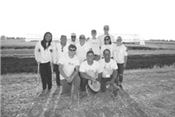|
Advanced Technology

Shown in the photo from left to right is Dave Feist, Asset Manager with Adama and Dr. Brian Ottis, Global Solutions
Development Lead for RiceTec.
Photo by John LaRose Jr.
RiceTec Offers New FullPage Rice Seeds In October
Betty Valle Gegg-NAEGER
MidAmerica Farmer Grower
HARRISBURG, ARK.
Farmers can purchase the new RiceTec FullPage Cropping Solution rice next month, according to Dr. Brian Ottis, Global Solutions Development Lead for RiceTec, who spoke at the recent field day here. “We’re talking about several new things we have going on at RiceTec, the most important of which is our FullPage Rice Cropping Solution, our proprietary IMI (imidazolinone) tolerant rice system,” he said. “This will give hybrids the most tolerance to the IMI herbicides in rice.”
RiceTec has taken two IMI tolerance traits and combined them, put them in both parents to make a hybrid so the tolerance to the herbicides is greatly improved.
If growers were using only using a 4 oz. rate of imazethapyr they can now use a 6 oz. rate with no problem.
“We’ve seen upward of a four times rate tolerance to this herbicide with no visible injury,” he noted.
With both Preface (imazethapyr) and Postscript (imazamox), RiceTec has partnered with Adama on its herbicides and they’ll be available on the market next month. A few hundred thousand acres of FullPage seed will be available on the market next year primarily made up of two hybrids.One will be RT7521 FP, which is very similar to Gemini, very high yielding and has good quality. The second is RT7321 FP, which will be very similar to XP753, in maturity and performance.
“We’re pretty excited about those,” Ottis said. “We expect standard milling, pretty much everything you’ve come to expect from a RiceTec hybrid is in these products. We’re using all our leading parents, materials to create these products. They’re going to be taking over our portfolio in the coming years.
“These products will be available for purchase in October when we begin our sales season,” Ottis continued. “I would imagine the fact that they’re new they’re going to go fast, so if anyone is interested in trying FullPage on your farm, especially if you have areas where you need herbicide tolerance to combat such as weedy rice or red rice, you definitely want to look into FullPage. But get it early because it’s going to go fast.”
Along with areas that have red rice, the new system works well in continuous rice areas, zero grade, possibly in Southern Louisiana and east of Houston, parts of Southeast Missouri and Arkansas where Clearfield has been used.
“I think herbicide tolerant rice usually hovers around 50 percent of the market, and I don’t see that changing, but I do see a shift from Clearfield to FullPage in the next three years. With that, there are just constant improvements, primarily in herbicide tolerance,” Ottis said.
RiceTec has other lines coming, other hybrids that will carry the trait, including a medium grain which is a couple of years away, and it looks promising.
“Performance-wise, growers shouldn’t expect anything different,” he explained. “The maturity of the products is the same, the milling and price are the same. What they can expect is a much better tolerance on the hybrid platform to the IMI herbicides Preface and Postscript. The weed control will be there. Expect everything to be very similar, the key difference will be the herbicide tolerance.”
Another thing RiceTec will be offering is Cruiser Maxx Rice on its FullPage and conventional hybrid seed this year and a good portion of the rice will be available with Dermacor. RiceTec will target that seed to the Gulf Coast Areas. “We’re pretty excited about that,” he said.
He urged farmers to keep an eye out for the new offerings from RiceTec.
“We have lots of interesting things coming. We have some other herbicide tolerance products in the pipeline to be released in the next two to three years. We have some super high-quality products, two of which we’re showcasing here. One is RT7801, a high amylose nice clarity product, and the other is RT7501, a high yielding very nice low chalk product we have here on display.”
RiceTec also has three other experimental hybrids that will have different types of benefits in the marketplace, earliness, maturity, and milling. They were on show at the field day and more is expected in coming years.
High Night Temperature Stress Tolerance
Dr. Angela Lorence, James and Wanda Lee Vaughn, Endowed Professor in the Department of Chemistry and Physics of Arkansas State University, explained the High Night Temperature (HNT) stress tolerance program at a tour stop at the field day.
This is a project funded by the National Science Foundation. The partners in Arkansas are Arkansas State University, the USDA-ARS Delta Water Management Unit and RiceTec. Partners outside of Arkansas are the University of Nebraska, Lincoln, and Kansas State University.
“This is an important project because we are tackling high nighttime temperature stress in rice,” she said. “This is the stress that’s killing the yield in both rice and wheat. In particular, in Arkansas we are focusing in rice. We are screening 320 different rice varieties from around the world looking for those that are tolerant to high nighttime temperature stress. This is what is dropping the quality and yields of rice.”
With each increased degree centigrade of nighttime temperature, there is a 10 percent yield loss in rice.
“That’s a lot of money, a lot of losses,” Dr. Lorence said. “So we are trying to find those varieties that are tolerant to this stress so we can in the future develop varieties that are more resilient and will allow us to sustain rice production which is very important for the Arkansas economy and U.S. economy.”
Her take home message is that it’s crucial that this crop remains resilient. ∆
BETTY VALLE GEGG-NAEGER: Senior Staff Writer, MidAmerica Farmer Grower

Dr. Angela Lorence (pictured) , James and Wanda Lee Vaughn Endowed Professor in the Department of Chemistry and Physics of Arkansas State University, explained the High Night Temperature (HNT) stress tolerance program at a tour stop.
Photos by John LaRose Jr.

The Arkansas WRCHR team showing the high tunnel greenhouses they built at the RiceTec Experimental Station (Harrisburg, AR); 320 rice varieties from around the world are being screened to look for those with natural tolerance to high night temperature stress. Back row: Kharla Mendez, Dr. Arlene Adviento-Borbe (USDA Delta Water Management Unit), Shannon Cunningham, Dr. Angela Lorence (A-State), Hannah Seats, Hayes Huff, Cherryl Quinones, and Abigail Wilkie. Front row: Dax Hurst, Landon Purdue, and Wency Larazo.
|
|